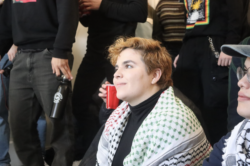A brutal drama about the assassination of a Latin American priest might not be at the top of most students’ must-watch lists, but for the 10 students who participated in Campus Ministry’s spring break trip to El Salvador, it was riveting.
On Tuesday, several of the students gathered in a common room in McCarthy to watch a movie about Archbishop Oscar Romero, who advocated for the poor during the unrest preceding the country’s civil war, which lasted from 1980-1992. They also talked about their experiences in Romero’s home country, where they observed the March 15 election, which saw the liberal FMLN party defeat the conservative Arena for the first time ever.
“[Arena] … came to power during the civil war,” Government Professor Barak Hoffman, who has observed elections in Argentina and Pakistan, said. “No one knew what would happen when they were challenged.” Hoffman added that the first transition from a ruling party to an opposition faction is a major test for young democracies, and that observers during these elections can help ensure that people trust the legitimacy of the process.
The group met with Salvadoran citizens prior to observing the election in conjunction with the SHARE Foundation, a non-profit organization. On Election Day, they watched a polling station and took notes for a SHARE report. Hoffman noted that the tasks assigned to an observer are well within college students’ capabilities.
Though the students executed their duties impartially, some acceded it was difficult not to feel strongly about the results of the election.
“SHARE is officially non-partisan, but just in the work they do, they lean towards FMLN … so we came in with that influence,” Colleen Kerrisk (COL ’10) said.
Katie Suter (COL ’11) agreed, adding that she struggled to remain impartial after speaking with local residents.
“Talking to the people who are really poor, they were all so invested in FMLN, so we became really invested in FMLN, too,” she said.
On Tuesday, the students often interrupted the movie to point out things they had learned and experienced during the trip.
“Santos, our bus driver, told us that basically during this time, it was a crime to be young,” Suter said during a scene which depicted soldiers mowing down a peaceful crowd. Later, when one character flipped through a photo album, Alberto Camacho-Rojas (COL ’11) remembered that a community they visited surrounded a crucifix with pictures of people they knew who had been murdered during the civil war.
Despite the dark history of the country, students were hopeful for El Salvador, noting that FMLN has pledged to do more for poor citizens, and that many people saw Barack Obama’s election as a positive step in U.S.-Salvadoran relations.
The trip was about more than political statements, however: Kerrisk reminisced about sitting on the steps of a church on Election Day and being surrounded by curious onlookers who were observing them.
“We were there to watch, but they were watching us, too,” she said.




